Affordable and high-quality audio interfaces for Shure SM7B.
As a video editor, I often use Shure SM7B in my workflow. This tool appeals to me with its ability to produce rich and clear sound, but it also disappoints me with its low gain, which is the source of such problems as weak signals, increased background noise, and occasional distortion when using a lower-powered audio interface.
To make things better, I decided to purchase the audio interface for Shure SM7B that provides enough gain and can record clean, distortion-free sound. This upgrade brought my video editing workflow to a new level, allowing me to produce pro-level audio and focus on the creative aspect of the development of my project.
When selecting the best audio interface for Shure SM7B, I made sure that the desired model has high gain to handle the mic’s low output, high-quality preamps that produce a clean, noise-free sound, and seamless integration with different music-making apps.
Making sure that the interface can produce crisp, distortion-free recordings was of paramount importance for achieving pro-level audio quality in my projects.
Connectivity: USB Type-B | Protocol: USB 2.0 | Resolution: 24-bit/48kHz | Number of Channels: 4
The TC-Helicon GoXLR is a professional audio interface that has been designed for microphones. I've found it incredibly versatile, whether I'm recording vocals, playing guitar through the interface, or mixing live audio. I can easily send recorded sounds from my computer to the Shure mic, and the audio is seamlessly transferred into the mixer.
The direct monitoring feature is another highlight, allowing me to hear my mixes in real time without needing to switch between the sound interface and the microphone. The top-notch MIDAS preamp, which boasts offering 48V phantom power and a range of controls like the equalizer, compressor, limiter, de-esser, and gate, can make Shure SM7B shine.
Another addition, which is worth your attention, is voice FX, which allows me to add reverb, echo, pitch shift, and more in real-time. The GoXLR Windows app is indispensable as it allows controlling the audio parameters, sample import, and voice FX presets, to customize my setup without trouble.
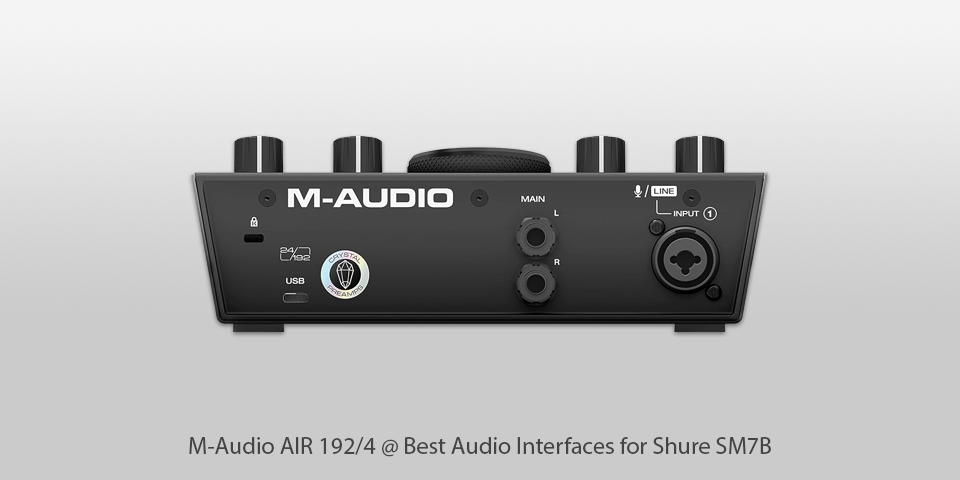
Connectivity: USB Type-C | Protocol: USB 2.0 | Resolution: 24-bit/192kHz | Number of Channels: 2
M-Audio AIR 192|4 is suitable for different setups. Whether you need to plug it directly into the interface or to Shure SM57 microphone, the sound quality it delivers is superior quality. This model is reliable, user-friendly, and portable, so you can easily put it in your backpack for hassle-free transportation. The interface is fitted with large, well-spaced knobs to adjust the parameters effortlessly.
The low latency is amazing, thanks to the Hi-Speed USB-C connection, which makes the recording process seamless and responsive. The Crystal preamps and A/D converters deliver crisp, transparent audio, to deliver the SM7B to shine.
The variety of connectivity options of this audio interface for Fl Studio is another great plus. Using them, I could easily record both vocals and guitar right into the interface. I also like its rugged metal chassis, as well as its large central volume control for tweaking settings with ease. Whereas VU LED meters and USB/Direct knobs are great for zero-latency monitoring.
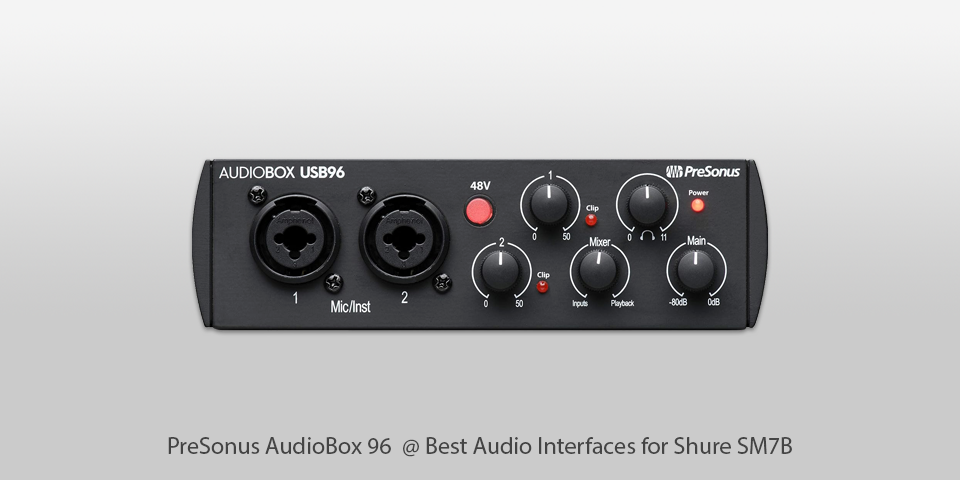
Connectivity: USB Type A, USB Type B | Protocol: USB 2.0 | Resolution: 24-bit/96kHz | Number of Channels: 2
As my experience has shown, PreSonus AudioBox 96 is a decent sound card for Shure SM7B for personal and portable recording. It features two Class-A mic preamps that deliver first-rate sound, letting users capture the warmth and clarity of SM7B with ease.
Its USB interface makes it possible to work directly with the audio data without having to use a sound card. The USB bus power via USB 2.0 contributes to the portability of this model, so you won’t have to use an external power supply. PreSonus AudioBox works with both Mac and Windows operating systems.
Its converters can record up to 24-bit/96 kHz sound of studio-grade sound, whereas the inclusion of such functional software as Studio One Artist and Ableton Live Lite, which cost over $1000, makes AudioBox96 even more attractive for users. The mixer control is another prominent feature of this audio interface for Ableton. It allows blending inputs and playback for zero-latency monitoring.
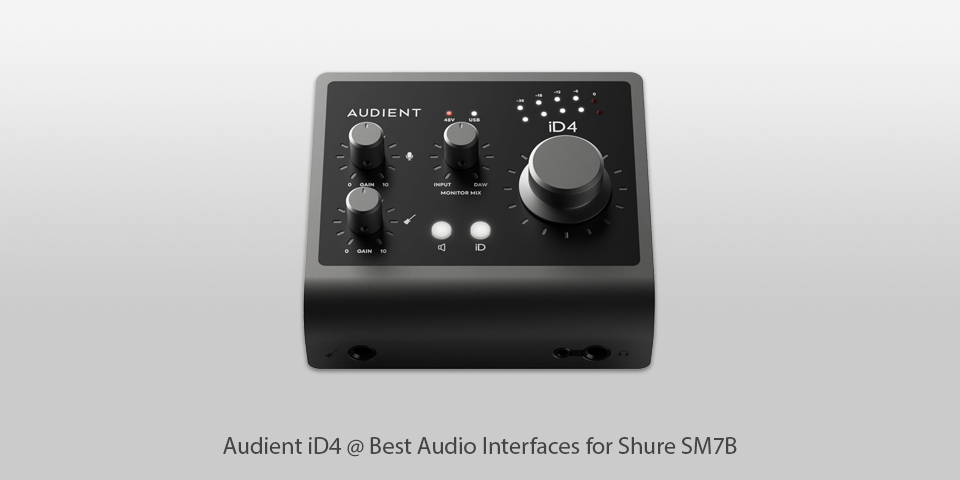
Connectivity: USB Type-C | Protocol: USB 3.0 | Resolution: 24-bit/96kHz | Number of Channels: 2
The Shure SM7B is a top-level podcast mic, but the hiss it tends to produce can be very annoying. The Audient iD4 copes with this problem with ease, delivering crisp and distinct sound. This audio interface for Cubase attracts me with an intuitive installation, impressive sound quality, and studio-grade performance.
Audient's high-end ASP8024 HE console offers a new transducer technology and Class-A mic preamp to bring my home recording experience to a new level. Its high-speed USB-C connector is another worthy edition, allowing you to forget about any unpleasant power supply issues. This model has a durable metal construction, which makes it safe to use on the go.
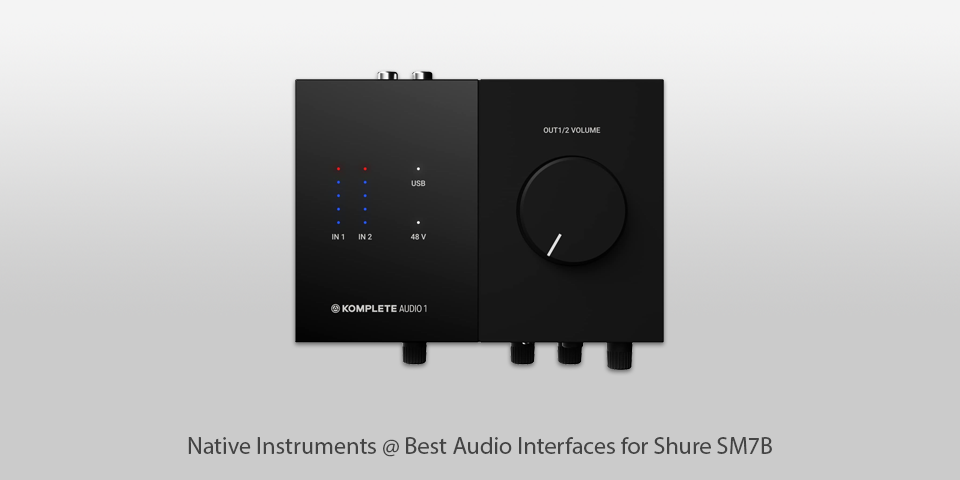
Connectivity: XLR | Protocol: USB 2.0 | Resolution: 24-bit/192kHz | Number of Channels: 2
The Native Instruments interface is perfectly compatible with the Shure SM7B, providing both intuitive operation and amazing sound quality.
The audio interface has been designed in a way that permits recording and mixing both in mono and stereo, and provides facilities such as panning, volume, mute, direct recording, and effects. Its stereo RCA outputs allow connecting directly to hi-fi speakers and playing everything out loud with amazing clarity.
In addition, this audio interface for Sonar also supports the synchronization of two channels of audio at the same time, so that they can be played together in sequence. Furthermore, there are many additional useful features like recording length, recording position, display of level, display of timing, display of level balance, and undo facility.
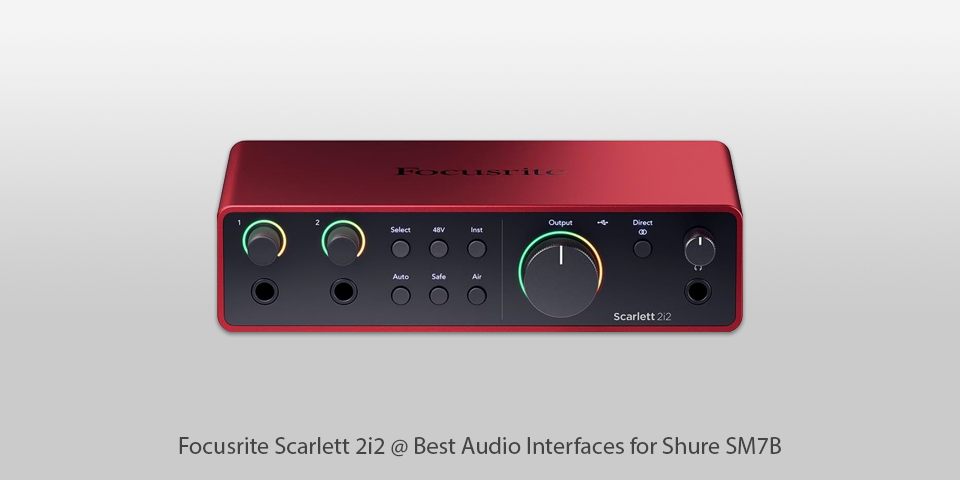
Connectivity: USB Type-C | Protocol: USB 2.0 | Resolution: 24-bit/192kHz | Number of Channels: 2
Intuitive setup was the first thing I appreciated about this Audio Interface for Shure SM7B. Its construction quality is solid and durable. This model delivers virtually no noise and clear sound, whereas a handy Air mode allows for adding a bit of spice to the recordings. This audio interface offers a 120dB dynamic range, so the recorded sound is incredibly detailed and of high quality.
The Hitmaker Expansion software bundle includes various plugins and tools to refine my tracks, which is a huge plus. Auto Gain and Clip Safe are the highlights of this model. They eliminate the need for dealing with technical issues like setting levels or clipping, letting me focus on creative aspects of my workflow.
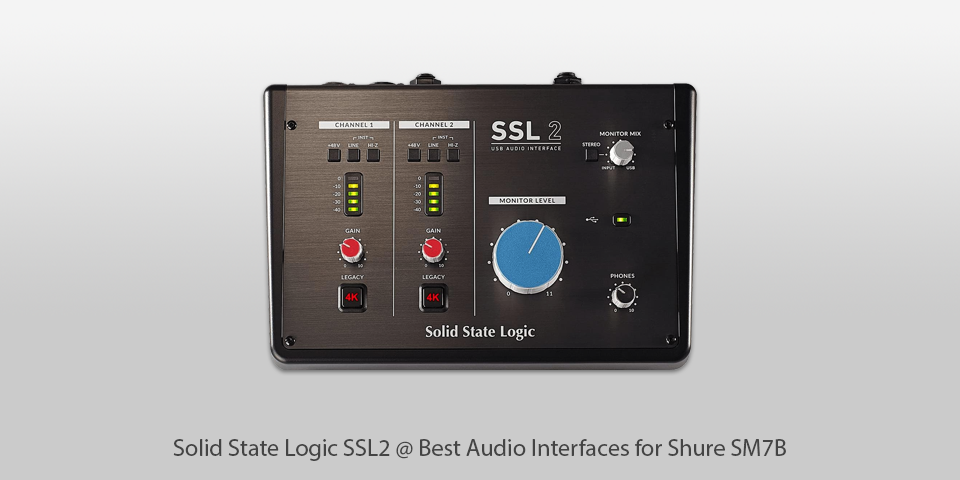
Connectivity: USB Type-C | Protocol: USB 2.0 | Resolution: 24-bit/192kHz | Number of Channels: 4
This is one of the best interfaces for SM7B, as it offers a Legacy 4K Analogue Enhancement circuit to add some warmth to the recordings. Solid State Logic SSL2 has two channels with precise gain control (62db), low latency, and USB connectivity. Besides, the SSL Production Pack software bundle also includes helpful plugins.
This audio interface for Logic Pro X offers reliable performance and has a warranty. A high-current headphone amp is really impressive and has the necessary power to monitor my tracks. Pro-level Neutrik connectors and Alps pots add to the durability and reliability of this model.
| IMAGE | NAME | FEATURES | |
|---|---|---|---|

|
TC-Helicon GoXLR
MULTI-CHANNEL
|
CHECK PRICE → | |

|
M-Audio AIR 192/4
RELIABLE
|
CHECK PRICE → | |

|
PreSonus AudioBox 96
EASY TO USE
|
CHECK PRICE → |

Low output is the visiting card of the Shure SM7B, so it is crucial to select an audio interface that provides sufficient gain, maintains audio quality, and offers the necessary features. Here is a guide on how to choose the right option.
The gain control range defines the ability of an audio interface to amplify an audio signal. The Shure SM7B needs much gain (usually around 55-60 dB). So, it is essential to choose the model with top-level preamps (minimum 60dB) that can deliver sufficient gain with no noise.
If the interface does not provide ample gain, you can try to use a mic activator like the Cloudlifter or FetHead to amplify the signal before it reaches the interface.
As the Shure SM7B is a studio-grade mic, using it in combination with the interface that boasts crisp and transparent preamps will ensure that the recorded sound will be true and feature no noise. Thanks to a pro-level preamp, low-level analog signals will be brought up to line level. It also accounts for sound coloration.

To define the required number of channels, you should evaluate your recording needs first. If you are planning to capture the sound using one microphone, then a 1-in/2-out audio interface will be a great option. In such a way, you will have one input for your mic, and two outputs to connect your speakers and headphones.
To record multiple mics, an audio interface with more inputs will be a more suitable option. For instance, if you are going to record a drum kit, you will need to purchase an audio interface with a minimum of eight inputs.
MIDI input/output, a quality headphone jack, and monitor mix controls are other features to look for in the best audio interface for SM7B. Some bundles include software like DAW software or plugins, which are a really great addition. Such features can bring your recording experience to a new level.
Yes, you will need an audio interface for the Shure SM7B, as it is an analog mic that lacks digital communication capabilities. The interface is required to connect a mic to a PC, tablet, or phone.
The Shure SM7B is a dynamic mic with a low output, so it needs ample gain (typically around 55-60 dB) to function properly. You should be aware of the fact that many audio interfaces provide insufficient gain or do not have preamps, so they introduce noise when paired with this microphone.
A standard XLR cable is required to pair your Shure SM7B microphone to an audio interface. These cables ensure smooth connectivity and provide effective protection against interference, especially, which is crucial when dealing with longer cable runs.
Using a suitable XLR to USB audio interface, it is possible to connect the microphone directly to a PC. As a mic is not fitted with a USB output, an external audio interface is required to hook it up to a computer’s USB port.
Yes, such mic boosters as Cloudlifter or FetHead can work with any audio interface. These devices are designed to provide additional clean gain before the signal gets to the interface, ensuring the SM7B’s optimal performance even when paired with interfaces that have lower gain preamps.
No, you won’t need a phantom power supply for the SM7B. An audio interface that can provide enough gain is enough to ensure optimal performance of your mic.